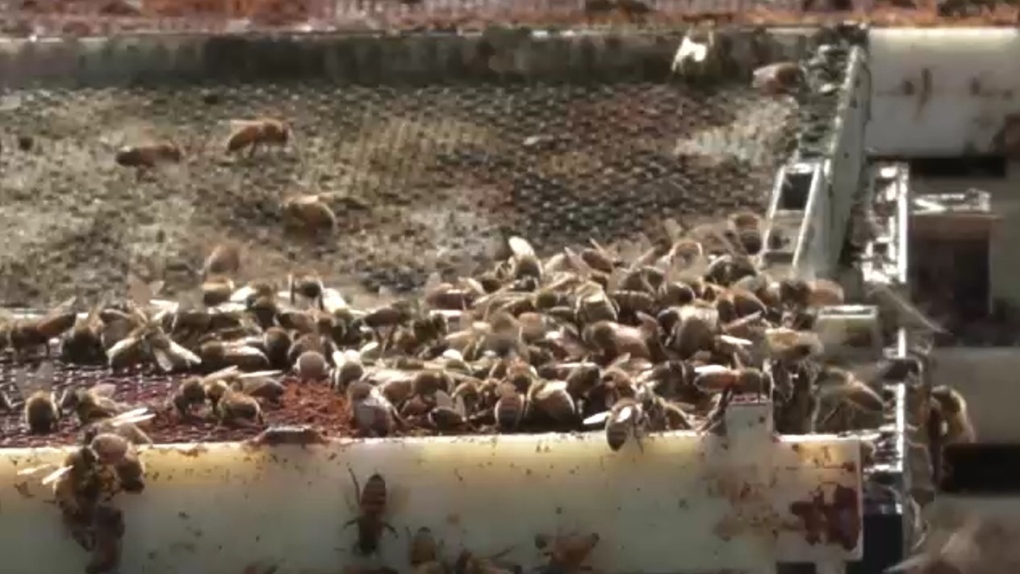Nearly 2M bees imported to Vancouver Island from New Zealand
 Bees are pictured in North Oyster, Vancouver Island. (CTV News)
Bees are pictured in North Oyster, Vancouver Island. (CTV News)
Some 1.75 million bees from New Zealand are acclimatizing to Canada's climate on a farm in North Oyster, Vancouver Island.
The imported bees have been added to a range of domestic hives in the Cowichan Valley, bringing the total to number of bees in the region to 3.5 million.
A team of apiarists from Nanaimo and Saskatchewan are caring for the bees before they are taken to Saskatchewan to begin pollinating canola and other crops.
"With a lot of seasonal variation, that’ll probably be end of April early May-ish, when hopefully the rest of Western Canada is thawed out a little bit more," said apiary technician Ryan Oman as he stood among the buzzing bees that he's helping care for.
The warmer temperatures on the island are ideal, but the lack of blooming flowers requires the bees to be fed a sugar-water syrup and artificial pollen.
Oman said New Zealand is considered a safe place to import bees from as it only exports bees and does not import them.
The need to import bees is due to a continued die-off in Canada caused most likely by mites.
"Varroa destructor, it causes havoc on the hive," said Oman.
"It’s a tricky one to deal with too. We’re starting to see resistance to a lot of common place treatments. You have to be smart to deal with the mite."
Oman says importing will continue until Canadian beekeepers are able to produce enough bees to share with others in the business.
As challenging as keeping bees can be, Oman says it is rewarding.
"If you like working with your hands, if you like biology, if you like science, if you like nature, it’s cool that way," he said.
"Anyone who tells you they know everything about beekeeping, they’re lying to you, because there’s always something to learn," he added.
CTVNews.ca Top Stories

NEW From yearning for a change to cost of living, why some Canadians have left or may leave the country
For some immigrants, their dreams of permanently settling in Canada have taken an unexpected twist.
Here are the ultraprocessed foods you most need to avoid, according to a 30-year study
Studies have shown that ultraprocessed foods can have a detrimental impact on health. But 30 years of research show they don’t all have the same impact.
NEW Capital gains tax change 'shortsighted' and 'sows division' business groups tell Freeland
Forging ahead with increasing Canada's capital gains inclusion rate 'sows division,' and is a 'shortsighted' way to improve the deficit, business groups are warning Finance Minister Chrystia Freeland.
Ontario man frustrated after $3,500 paving job leaves driveway in shambles
An Ontario man considering having his driveway paved received a quote from a company for $7,000, but then, another paver in the neighbourhood knocked on his door and offered half that rate.
Defence attacks Stormy Daniels' credibility as she returns to the stand in Trump's hush money trial
Stormy Daniels will return to the witness stand Thursday in Donald Trump's hush money trial as the defence tries to undermine the credibility of the porn actor's salacious testimony about their alleged sexual encounter and the money she was paid to keep quiet.
With contactless screening tech, this Toronto startup hopes to catch breast cancer early — and save lives
Amid evidence of rising breast cancer rates among young women in Canada, one Toronto startup is offering a contactless and radiation-free device that can help doctors identify suspicious changes in breast tissue. The company, Linda Lifetech, says this can lead to earlier detection of breast cancer.
Tornadoes tear through southeastern U.S. as storms leave 3 dead
Forecasters warned a wave of dangerous storms in the U.S. could wash over parts of the South early Thursday, a day after severe weather with damaging tornadoes and large hail killed at least three people in the region.
Police handcuff man trying to enter Drake's Toronto mansion
Toronto police say a man was taken into custody outside Drake's Bridle Path mansion Wednesday afternoon after he tried to gain access to the residence.
What is whooping cough and should Canadians be concerned as Europe declares outbreak?
There is currently a whooping cough epidemic in Europe, with 10 times as many cases compared to the previous two years. While an outbreak has not been declared nationwide in Canada, whooping cough is regularly detected in the country.































